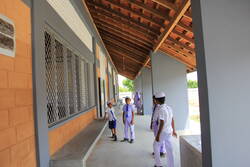In Sri Lanka, cooperation between the Government and UN-Habitat has a long history, dating back to 1978, with UN-Habitat providing assistance to a range of national programmes, city-based projects, policy support and post disaster and post conflict reconstruction assistance.
Impact
Urban numbers
Challenges
Sri Lanka currently stands at an urban paradox with regard to urbanisation. According to the last census (2012), Sri Lanka was populated by 20.3 Mn people, including 3.7 Mn urban residents (18.2 per cent of the population). Due to this small urban population, Sri Lanka is ranked as the 11th least urbanized country in the world in the 2018 UN World Urbanisation Prospects (UNDESA, 2018). However, there is considerable evidence that official urban population data masks the true extent of the country’s urbanization. According to the Agglomeration Index, Sri Lanka’s urban population is between 35 – 45 per cent while GOSL policy documents estimate a 50 per cent urban population (GOSL 2017).
Urban sprawl, land scarcity, climate change and disaster risk vulnerability, environmental pollution, encroachment of ecologically sensitive areas, urban traffic congestion, diminishing green cover, inadequate housing and poor access to services in underserved settlements and plantations are some of the main challenges to sustainable urbanization in Sri Lanka.
Country Beneficiaries

“Now our school has a brand new classroom building with a canteen and kitchen facilities. The Child Friendly Schools concept has been followed in constructing these facilities. The classroom building has hand washing stations, bag holders, pigeon holes and accessibility for differently abled persons. This has created an inspiring learning environment for the school children and teachers.”
Mr. K.R. Yasar Arafath, Principal, MN/Koolankulam Government Muslim Mixed School, Mannar district
Donors and partners
UN-Habitat Sri Lanka adopts a participatory process in the implementation of all its programmes. All initiatives are developed and implemented in partnership with a range of key stakeholders and partners. At the commencement of programmes, effective partnerships are formed within the community to ensure collaborative decision making, problem solving and resource sharing. Communities are instilled with a sense of ownership, trust, solidarity and accountability by working together as a team. Effective links between the communities, local and central government departments, civil society, community based organisations and donors facilitate a smooth transition of benefits through these programmes to the people of Sri Lanka.
Donors
Donors
Legacy content
- Total value of UN-Habitat investments (2008-2013): US$ 44,385,934
- Total number of UN-Habitat projects (2008-2013): 18 projects
- Main donors: International Fund for Agriculture Development (IFAD), Australian Aid Agency (AusAID), European Commission (EC), Swiss Agency for Development and Cooperation (SDC), the Government of India and the Government of Sri Lanka
- Implementing partners: local government ministries, agencies and other local authorities; international NGOs such as the International Federation of the Red Cross and Red Crescent (IFRC), as well as other UN agencies like the United Nations Development Programme (UNDP)
Sri Lanka has a total population of 20 million and the annual population growth is less than 1%. The country has benefited from the conclusion of a three decade long conflict in 2009 and the country’s achievement of Middle Income Country (MIC) status. Sri Lanka has made good progress on MDGs with early achievement of its targets on safe drinking water, and basic sanitation. Overall access to secure tenure is 95.2%.
General information
Although official figures state that the urban population has increased by only 2% over the past decade, there has been rapid urban development through the expansion of urban areas. This urbanization calls for increased investment in basic urban services, mass transportation, improved road safety, reduction of air/noise pollution, environmental hazards and improved town planning.
Since 1978, UN-Habitat has assisted in the development of human settlements policies in Sri Lanka, ranging from the Colombo City Master Plan in the 1980’s to advocating enabling approaches that promoted participatory planning and development, focusing on reduction of poverty and promoting inclusiveness. Parallel to these efforts, UN-Habitat has shared its global experience to assist Sri Lanka in mitigating the impacts of natural/manmade disasters.
Key achievements of the recent past include assisting the communities to construct nearly 40,000 post-disaster houses, national/local interventions in climate change mitigation, DRR and innovative low income settlement upgrading programmes.
UN-Habitat projects in Sri Lanka
Project for Rehabilitation of Community Infrastructure and Facilities in the Conflict Affected Areas in Northern Province of Sri Lanka
- Donor: Government of Japan
- Location: Killinochchi and Mullaitivu districts
- Outcome: 60 km of internal access roads including culverts, 14 RWH facilities, 14 km of masonry storm water drains, 19 community centers, 19 pre-schools, 130,00 trees planted.
Indian Housing Project
- Donor: Government of India
- Location: Killinochchi, Mullaitivu & Jaffna districts
- Outcome: 16,800 houses, skills and alternative technologies training.
Improving Living Conditions in Returnee Areas of Sri Lanka through Housing
- Donor: EU, Australian Government, SDC
- Location: Killinochchi, Mullaitivu, Batticaloa and Mannar districts
- Outcome: 4,350 houses and community infrastructure.
Support to Conflict Affected People through Housing
- Donor: EU, Government of Australia, SDC
- Location: Vavuniya, Killinochchi, Mullaitivu, Mannar districts
- Outcome: 5,049 houses and community infrastructure.
Disaster Resilient City Development Strategies Sri Lankan (Phase I and II)
- Donor: Government of Australia
- Location phase I: Cities of Batticaloa, Ratnapura, Kalmunai and Balangoda (concluded)
- Location phase II: Cities of Mannar, Vavuniya, Mullaitivu and Akkaraipattu
- Outcome: Vulnerability assessments, Preparation of Disaster Preparedness Plans, Capacity building of Local Authorities to promote disaster resilient human settlements.
Contacts
Address: UN-Habitat Programme Manager, United Nations Human Settlements Programme (UN-Habitat) 202-204, Bauddhaloka Mawatha Colombo - 07, Sri LankaPhone: +94 (0) 11 2580691 Ext: 342Fax: +94 (0) 11 2581116Web: www.unhabitat.lkEmail: info@unhabitat.lk

